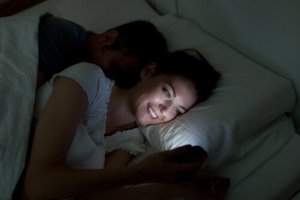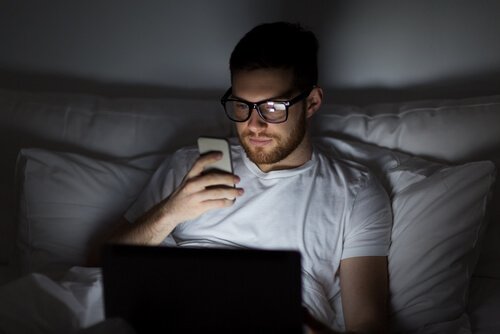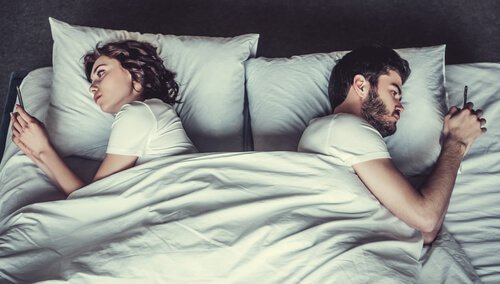Digital Insomnia and Keys to Stopping It

Many people use their cell phones or computers before bed. Then, they have a hard time falling asleep. This is because electronic devices emit a blue light that affects our brains by causing a reduction in the segregation of melatonin, a hormone that tells the body it’s time to sleep.
This phenomenon is known as digital insomnia, which is a condition that affects sleep. It either makes a person get less sleep or have poor quality sleep. And this isn’t just due to the effect of lights and screens. It’s also due to the inability to fully disconnect from our daily concerns.
Overstimulating the brain causes digital insomnia
Many people check their phones just before bed, and a good number of people do it when they wake up in the middle of the night. For many people, it’s also the first thing they do as soon as they wake up. This means that we can’t pull ourselves away from technology, social media, or work when we should be resting.
The succession of screens, images, and hyperactivity fostered by the Internet overstimulate the brain. This causes the nervous system to send signals contrary to what the body needs late at night.

Digital insomnia and screen light
As we mentioned above, the artificial light devices such as cell phones, laptops, and tablets emit is one of the most common causes of digital insomnia. This is because blue light disrupts melatonin secretion.
This hormone should begin to be released at least an hour before we fall asleep. However, the effect of blue light alters its production, which makes it harder for us to fall asleep. Some devices, such as electronic books whose screens are usually opaque and black and white, are less harmful.
What are the main causes of digital insomnia?
In addition to blue light devices emit, there are other factors that contribute to digital insomnia:
Binge-watching TV
Spending too much time in front of the television, especially just before bed, can alter your sleep quality. A less harmful activity is reading before bed, which can help you relax.
Not putting your phone down
Using your phone as an alarm and leaving it on your bedside table means that your phone is no longer just a phone. It’s a device that you use at all times. In addition, using your phone before bed makes it impossible to disconnect from social networks and daily concerns.

Online video games
Online video games can be really addictive. Many people spend hours immersed in these games, playing right up to their bedtime.
In addition, for some time now, video games have stopped being directed almost exclusively at kids and teenagers. Nowadays, people of all ages play and, although this may have a positive side, it also leads to digital insomnia.
How do you relax a hyperactive brain?
Although digital insomnia is a growing problem, there are different solutions that can reduce the negative effects technology has on our sleep. An interesting example of this is singing lullabies.
Classic songs that parents have used for ages to help children fall sleep have been incorporated into several mobile applications to help us sleep better. Ironically, this implies using a cell phone to help you sleep.
On the other hand, you can use earplugs, which allow you to isolate yourself from the external noises that keep you from sleeping. You can also use white noise to help you stop paying attention to distractions that might bother you at night. Reading is also highly recommended.
Above all, you should reduce the time you spend using electronic devices. You can even opt for pharmacological treatment, although you should consult a doctor first.
Many people use their cell phones or computers before bed. Then, they have a hard time falling asleep. This is because electronic devices emit a blue light that affects our brains by causing a reduction in the segregation of melatonin, a hormone that tells the body it’s time to sleep.
This phenomenon is known as digital insomnia, which is a condition that affects sleep. It either makes a person get less sleep or have poor quality sleep. And this isn’t just due to the effect of lights and screens. It’s also due to the inability to fully disconnect from our daily concerns.
Overstimulating the brain causes digital insomnia
Many people check their phones just before bed, and a good number of people do it when they wake up in the middle of the night. For many people, it’s also the first thing they do as soon as they wake up. This means that we can’t pull ourselves away from technology, social media, or work when we should be resting.
The succession of screens, images, and hyperactivity fostered by the Internet overstimulate the brain. This causes the nervous system to send signals contrary to what the body needs late at night.

Digital insomnia and screen light
As we mentioned above, the artificial light devices such as cell phones, laptops, and tablets emit is one of the most common causes of digital insomnia. This is because blue light disrupts melatonin secretion.
This hormone should begin to be released at least an hour before we fall asleep. However, the effect of blue light alters its production, which makes it harder for us to fall asleep. Some devices, such as electronic books whose screens are usually opaque and black and white, are less harmful.
What are the main causes of digital insomnia?
In addition to blue light devices emit, there are other factors that contribute to digital insomnia:
Binge-watching TV
Spending too much time in front of the television, especially just before bed, can alter your sleep quality. A less harmful activity is reading before bed, which can help you relax.
Not putting your phone down
Using your phone as an alarm and leaving it on your bedside table means that your phone is no longer just a phone. It’s a device that you use at all times. In addition, using your phone before bed makes it impossible to disconnect from social networks and daily concerns.

Online video games
Online video games can be really addictive. Many people spend hours immersed in these games, playing right up to their bedtime.
In addition, for some time now, video games have stopped being directed almost exclusively at kids and teenagers. Nowadays, people of all ages play and, although this may have a positive side, it also leads to digital insomnia.
How do you relax a hyperactive brain?
Although digital insomnia is a growing problem, there are different solutions that can reduce the negative effects technology has on our sleep. An interesting example of this is singing lullabies.
Classic songs that parents have used for ages to help children fall sleep have been incorporated into several mobile applications to help us sleep better. Ironically, this implies using a cell phone to help you sleep.
On the other hand, you can use earplugs, which allow you to isolate yourself from the external noises that keep you from sleeping. You can also use white noise to help you stop paying attention to distractions that might bother you at night. Reading is also highly recommended.
Above all, you should reduce the time you spend using electronic devices. You can even opt for pharmacological treatment, although you should consult a doctor first.
This text is provided for informational purposes only and does not replace consultation with a professional. If in doubt, consult your specialist.







